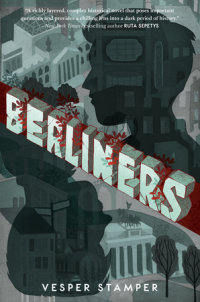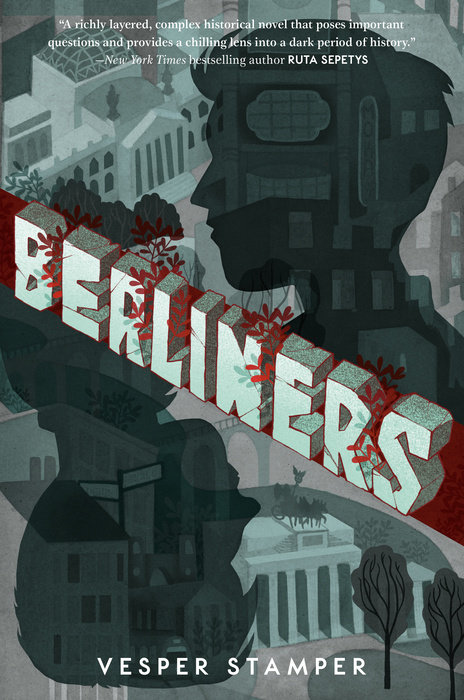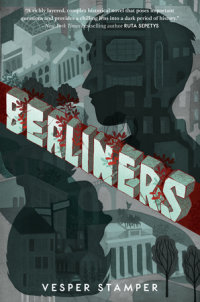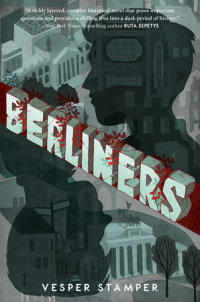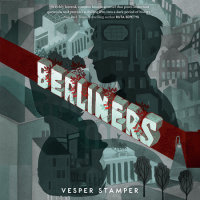Berliners
A riveting story about the rivalry between two brothers living on opposite sides of the Berlin wall during its construction in the 1960s, and how their complicated legacy and dreams of greatness will determine their ultimate fate.
A city divided. A family fractured. Two brothers caught between past and present.
Berlin, 1961. Rudi Möser-Fleischmann is an aspiring photographer with dreams of greatness, but he can't hold a candle to his talented, charismatic twin brother Peter, an ambitious actor. With the sudden divorce of their parents, the brothers find themselves living in different sectors of a divided Berlin; the postwar partition strangely mirroring their broken family. But one night, as the city sleeps, the Berlin Wall is hurriedly built, dividing society further, and Rudi and Peter are forced to choose between playing by the rules and taking their dreams underground. That is, until the truth about their family history and the growing cracks in their relationship threaten to split them apart for good.
From National Book Award-nominated, critically acclaimed author-illustrator Vesper Stamper comes a stark look at how resentment and denial can strain the bonds of brotherhood to the breaking point.
An Excerpt fromBerliners
April 1945
Stunde Null
When he thought about it years later, it was the book in the piano bench that had tipped him off.
Herr Richter was in the kitchen making a cup of tea while Rudolf waited in the parlor for his viola lesson, bored out of his skull. In the low golden light, the room so flowery, so pink, with its armchairs bedecked in cabbage roses, the ticking clock sent him into an afternoon drowse. Rudolf hated the viola. It had none of the panache of the violin, none of the glitter of the piano, which was his first instrument. He had only convinced his parents to let him take these lessons so he could get closer to Gerta.
Today she wasn’t even home, out with Frau Buchner on some errand. So Rudolf, after chewing his nails to nubs, picking at the callus on his left index finger and rosining his bow a third time, lifted the hinged lid of the piano bench and rifled through to see if there was anything interesting.
And there it was. Under the Christmas carols and Volkslieder, a book written in those funny letters he knew only Jews could read, and underneath the title, the translation: Yiddish Ballads.
Rudolf chalked it up to the collection of an eccentric musical couple; people had already begun accumulating artifacts for the time when those people would be extinct. Even though he was given his Hitler Jugend uniform and told to be on the lookout for hidden Jews, it still did not click in Rudolf’s mind.
But when, on another afternoon several weeks later, Herr Richter opened the cabinet to put more cigarettes into his brass pocket case, Rudolf spotted a small silver cup not much bigger than a schnapps glass and thought he made out the distinctive shape of a six-pointed star incised on its side. Then he knew.
It had to be true: Gerta Richter was Jewish. All this time, he had been fantasizing not about a girl, but about a Jew. It wouldn’t have mattered before, in the days prior to the Nuremberg Laws. But it did now. The thought simultaneously repulsed him--mainly because he had been told it should repulse him--and excited him. He had something to report at the next HJ meeting. It pained him, too, because he knew he would have to renounce Gerta. Purge himself of her. He would have to harden his heart and train himself to hate her.
Because he knew he would have to turn Gerta in. It was the Right Thing to do.
That is how Rudolf found himself standing in the midnight dark, watching from the edge of the crowd, emotionless, as the girl he had been in love with since her first day in the children’s choir was herded by guns and dogs onto a train with the rest of the filthy Jews of Wurzburg.
That is how, the next day, he was able to march mechanically up the stairs of Gerta’s flat with the throng of newly vested HJ and march Maria Buchner back down into the glaring sun of Residenz Square, to make her kneel on the cobblestones, and to personally shove the sign--which he had himself scrawled with the words Jew Lover--over the tangled bottle-blond hair of the famous operatic diva who had sheltered Gerta and her father.
That is how now, during the Battle of Berlin, he was able to grab a smoking Luger from the hands of a dying child soldier, younger than himself, just grab the gun from the bleeding-out boy who reached for Rudolf crying, “Mutti . . . Ich will zu meiner Mama. . . .”
Grab. Go. Do. Never feel.
Rudolf walked like an automaton through the crumbling city, ducking behind walls that stuck out of the dust like scraggly teeth. He shot anything that moved. Since his first decision to betray Gerta, his heart had become fossilized by thousands of minuscule choices. Years of convincing himself that down was up, east was west, wrong was right. Compassion was weakness. There was now no belief, no theory, no thought at all--only the animal will to survive.
So it was out of character for Rudolf Möser to save a girl’s life that day.
He didn’t know why he stopped for her. He’d passed dozens of dead compatriots and blubbering toddlers and old women with rubble falling around their shoulders. Buildings bulged and toppled in the non-light of war, dust obscuring all color and notion of time. Every landmark was blasted, the city formless, like a melted honeycomb.
But when Rudolf saw the girl hiding in that doorway, pointing a shaky pistol at whatever bastard would dare to mess with her, he knew he was going to help her. Not just help, but protect her. Not just protect, but marry her.
He saw it in her wild eyes. Standing out from the white war dust encrusting her face, her lips were deep red with lipstick precisely applied. There was something about that beautiful audacity that drew Rudolf to her like a supercharged magnet. For a moment, there was something else besides this war, besides buildings and bodies deconstructing themselves into hell and hate and noise. Those red lips drawn tight across her chalky face were more real than the shrapnel whizzing past his head.
He ducked into the doorway. She swiveled and pointed the pistol in his face. He put the rifle strap on his shoulder and lit a smoke. She didn’t back down.
He could see that she was trembling, not from fear, but from muscle failure. She must have been holding that gun for hours. She could’ve shot him, and felt no regret, either. He analyzed her face as he smoked. For a second, a fleeting moment, he was aware of their youth. That as cockily as he stood staring down the barrel of a 9-millimeter Volkspistole while smoking a cigarette, as littered as his past was with atrocity, as sure as her aim was likely to be, they were only children. That red lipstick lay between two cheeks still round with baby fat, the dust not broken by one wrinkle. Rudolf stared at her.
He thought of Gerta. He wondered if she was still alive.
“How old are you?” he asked the girl.
“Fifteen,” she said blankly.
“Next time, say eighteen,” he said. “Come with me.”
She blinked. She didn’t move.
“Come with me,” he repeated.
“I can’t,” she said.
“Why not?”
“I can’t move my arms,” she replied.
Rudolf advanced, took her pistol by its barrel, flipped on the safety and pried her numb fingers from the trigger. Instead of taking it away, he slipped the gun gently into the pocket of her trousers, took the girl by her khaki-clad shoulders and squeezed until the blood returned to her cold muscles. He puffed the cigarette as he massaged her arms, and the girl began to thaw, a tear carving through the concrete dust on her cheek. She put her head on the chest of this stranger and heaved a sigh of relief. And Rudolf held her as she broke down and sobbed.
Only then did they feel the first pangs of hunger in their bellies.
Ilse Fleischmann was dreaming about a faraway voice. Her father was calling her across a vast field, trying to tell her something important. She cupped her hands around her mouth and shouted, “Louder, Papa, I can’t hear you!” But he would not come closer, would not step his foot on the sea of golden flowers between them. Instead, he picked up a bullhorn, and at his shout, the flowers all wilted into a sea of brown, decaying back into the ocean of rubble that was Berlin.
“We are your liberators,” proclaimed the truck-mounted loudspeakers, in broken, Russian-accented German. “People of Berlin, the army of the Union of Soviet Socialist Republics has arrived. We are here to bring you freedom and peace. Freiheit und Frieden.”
Ilse shook Rudolf awake. They were lying on a mattress in a corner of a ramshackle room in a shop, or what was left of it. The bombs were no longer falling. It was strange not to feel the world shake. Everything smelled of blood and rot and gasoline.
Water was scarce and oily. Now and then they managed to find a puddle in which to splash the grime off their skin. Today they planned to go to the Volkspark and try to bathe in the fountain there or, if that was dry, to walk all the way to Weissensee. It was the only thing on their agenda, besides, of course, finding food.
The loudspeakers passed again and again.
“We are coming door to door. . . . Announce your surrender by hanging a white cloth in your window. . . . You must hand over all food and weapons. . . .”
They had hoped to have a few days to collect themselves before facing anyone. They were scared of Allied justice. They were most afraid of Russian revenge.
Every time they crept out of some crevice to find their next hiding spot, Ilse passed another woman with those hollow eyes, the dead shuffle, and she knew: word was spreading about Russian rape gangs. Komm, Fraulein became the worst command a woman could hear. The bullhorns may have announced peace, but in the air was a gleeful vengeance: it was time for payback. Four years before, the Nazis had brutalized Russia, their old ally, in a surprise attack. Any remaining German Communists had been exiled or thrown in concentration camps with the Jews and Gypsies. Now the Soviet soldiers were drunk on booze and pillage and broken German women.
“I won’t let them get you,” Rudolf promised, several times each day. “Do you trust me?”
Maybe Ilse did trust Rudolf, and maybe she didn’t; that was immaterial. He was there. So she stayed with him.
Ilse and Rudolf squatted in the shells of Berlin buildings, getting lucky every now and then and finding one with a roof, or a bed, or a cabinet of food. But they couldn’t hide forever. The time of running was over.
They tore up the sheet from the mattress and tied the white fabric to their belt loops and backpacks as a sign of surrender. They shoved their few belongings into the packs and walked out into whatever street this was.
Berlin was totally devoid of geography. Tram cars lay on their sides; automobiles rested upside down in second-story stairwells. Women in the open air of their bombed-out apartments were donning aprons and sweeping away the dust, setting their tables and straightening the art on the remaining walls. The whole city was a theater of small stages.
As quickly as they could, Ilse and Rudolf morphed in and out of other groups. There was some safety in numbers, as long as the group didn’t look big enough to riot. Whenever they saw Soviet soldiers ahead, asking for papers, Rudolf and Ilse ducked into an alley or courtyard. That’s how they got caught.
Three Soviet soldiers stood at the end of the alley as though they had been waiting for a moment just like this, for two young Germans to fall into their hands and get their comeuppance.
“Du kommst, Schatzi,” said the tallest one in terrible German, leering at Ilse.
Ilse’s heart pounded. She looked in her periphery: maybe she and Rudolf could turn and run back onto the street. But there was another soldier coming up behind them. Her hands itched for her pistol, but it was in her backpack. She’d never get it in time.
One of the other soldiers pushed the tall one back and rebuked him in his own language. He approached Rudolf first, with his hands up as though he were surrendering to them.
“We mean you no harm, deti. You look hungry. Da?”
Rudolf and Ilse stoically refused to answer.
“You are scared of Russians. Ich verstehe. We are here to rebuild. See?” The soldier crouched down and picked up two broken bricks from the rubble. Rudolf grabbed Ilse’s arm hard, ready to run or shield her with his body. Was this guy going to bash their heads in as a joke?
No, he went over to the wall and placed the bricks in a shell hole.
“We build,” he said. “We are . . .” He muttered to his comrade.
“Good guys,” said the other.
“We are good guys. Like in the movies. Now, we find you some rations. What are your names?”
Rudolf and Ilse registered with the Soviets and learned that they were in the neighborhood of Friedrichshain. Rudolf’s grandmother lived just a few blocks from there. She couldn’t have survived this destruction, but once he and Ilse filled their bellies with tinned fish and potatoes--a gift from Comrade Stalin--they attempted her address anyway.
Miraculously, there was one street sign standing in the rubble: Mainzerstrasse. Oma’s street. And one building rose, almost unscathed except for the texture of shell holes. Oma’s building.
They entered a corridor into the courtyard, winding a path through the debris, and climbed the stairs to Oma’s flat. The elderly woman answered the door, looking leathered and tired, a cigarette hanging from her lips. But when she saw Rudolf, she pulled him in close and held him like a little child. And so Rudolf and Ilse moved into his grandmother’s flat in the Soviet sector.
Oma had known privation--she had lived through two wars, four governments, a pandemic, widowhood--so her cooking was meager and formless and reliant on packets of powders. But it was regular, and she was happy to have mouths to feed. Something made her wary of Ilse, but Rudolf seemed happy, and as everyone came out of the postwar daze, people realized that family relations were of more worth than gold.
There wasn’t anything like a real job to be had. Money was mostly worthless. Rudolf got a tip from another kid: cigarettes were the real currency, and not just new ones in packs, either. The spent butts could be torn up and recycled into new cigarettes to barter and eventually sell. He could get so many pfennigs per hundred butts, and even more if he rolled new ones himself.
Ilse was assigned to the Trummerfrauen, the rubble women. For six marks a day and some ration tickets, she cleaned greasy soot off bricks, cleaned blood and flesh off pipes, cleaned shit off toilets. And so they rebuilt Berlin by hand. No one asked what they had been doing just a few months ago, when this was Hitler country. They all knew. They all silently agreed to forget.
Pretty soon, six marks a day wasn’t enough to live on. Ilse foraged for coins in the rubble, or toys or trinkets to sell. Every now and again, she found a dress that could be mended and sold. One day, as she was hawking her wares on the Western side of the Brandenburg Gate, Ilse ran into her old Leipzig friend Henni, who’d just procured a fashion magazine from an American soldier, and the girls pored over the latest styles from the States.
